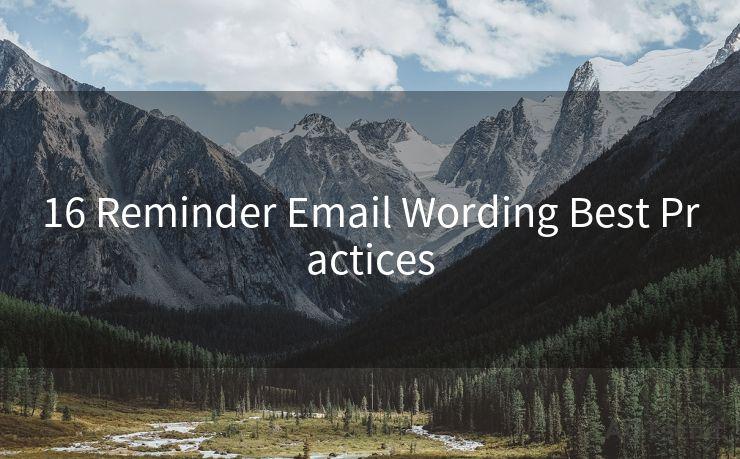16 Reminder Email Wording Best Practices




In the fast-paced world of business communication, reminder emails play a crucial role in ensuring tasks are completed and deadlines are met. Crafting these emails with clarity and professionalism is key to maintaining efficient workflows and positive relationships. Here are 16 best practices for wording your reminder emails to maximize their effectiveness.
1. Clear and Concise Subject Line
Start with a subject line that summarizes the reminder's purpose. For example, "Reminder: Upcoming Project Deadline on [Date]."

2. Personalized Greeting
Begin your email with a personalized greeting, such as "Dear [Name]," to establish a friendly and respectful tone.
3. Direct and Polite Introduction
Open with a brief introduction that clearly states the purpose of the email, e.g., "I am writing to remind you about the upcoming deadline for the [Project Name]."
4. Specific Details
Provide specific details about the task or event, including the exact date, time, and any relevant instructions or requirements.
5. Use of Positive Language
Maintain a positive tone in your email, avoiding accusatory or negative phrasing. For instance, instead of "You missed the deadline," opt for "The deadline for [task] is approaching, and I wanted to ensure you have everything you need to complete it."
6. Call to Action
Include a clear call to action, stating what you expect the recipient to do, e.g., "Please confirm receipt of this email and your progress on the project by [date]."
7. Offer Assistance
Offer to provide assistance or resources if needed, showing support and willingness to collaborate: "If you need any help or additional resources, please let me know."
8. Avoid Redundancy
Keep your message concise and avoid repeating information that has already been communicated.
🔔🔔🔔
【AOTsend Email API】:AOTsend is a Managed Email Service for sending transactional emails. Support Email Types: reminders, authentication, confirmations, notifications, verification codes, invoices, password resets, account activations, billing statements, two-factor authentication (2FA), and one-time passwords (OTP) emails, etc. $0.28 per 1000 Emails. 99% Delivery, 98% Inbox Rate.
You might be interested in:
Why did we start the AOTsend project, Brand Story?
What is a Managed Email API, How it Works?
Best 25+ Email Marketing Platforms (Authority,Keywords&Traffic Comparison)
Best 24+ Email Marketing Service (Price, Pros&Cons Comparison)
Email APIs vs SMTP: How they Works, Any Difference?
9. Friendly Closing
End your email with a friendly closing, such as "Thank you for your attention to this matter," maintaining a polite and collaborative tone.
10. Signature
Include a professional signature with your name, position, and contact information.
11. Follow-Up Plan
Consider mentioning when and how you plan to follow up, e.g., "I will reach out again next week to check on your progress."
12. Use of Templates
For recurring reminders, consider using templates to standardize your emails while maintaining personalization.
13. Check Grammar and Spelling
Always proofread your emails for grammar and spelling errors to maintain professionalism.
14. Avoid Attachments
Unless necessary, avoid sending attachments to keep the email lightweight and focused.
15. Privacy Considerations
Be mindful of privacy when sending reminders containing sensitive information. Use secure email options if available.
16. Test Email
Send a test email to yourself first to check formatting, links, and overall readability.
Incorporating these 16 reminder email wording best practices into your business communication will ensure clarity, professionalism, and effectiveness. Remember, the goal is to remind and assist, not to criticize or accuse. By following these guidelines, you can foster a positive and productive work environment through clear and respectful communication.




Scan the QR code to access on your mobile device.
Copyright notice: This article is published by AotSend. Reproduction requires attribution.
Article Link:https://www.mailwot.com/p6926.html



